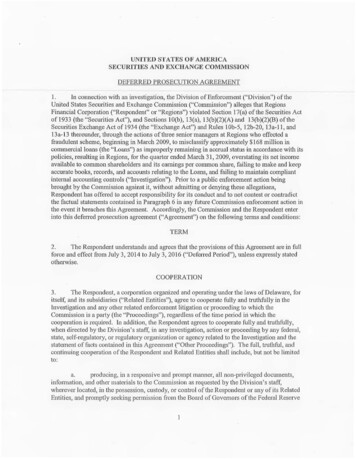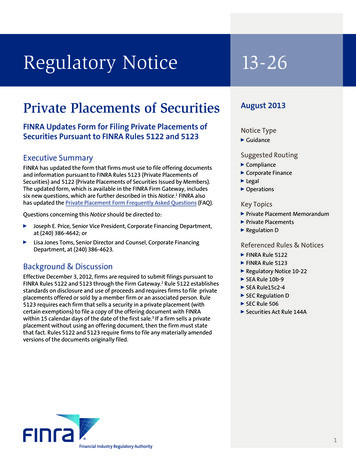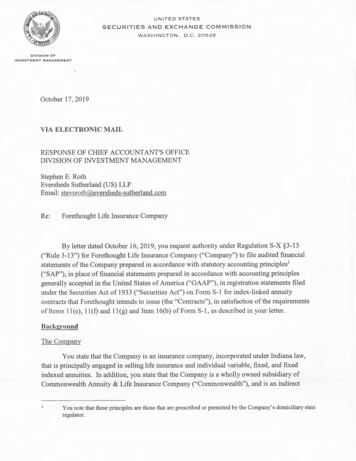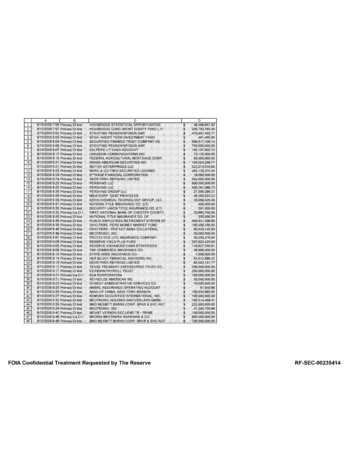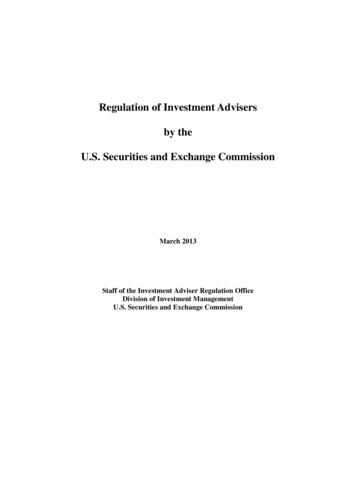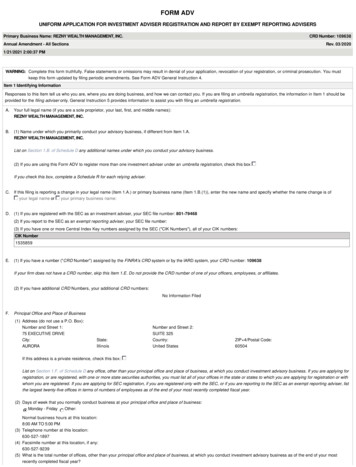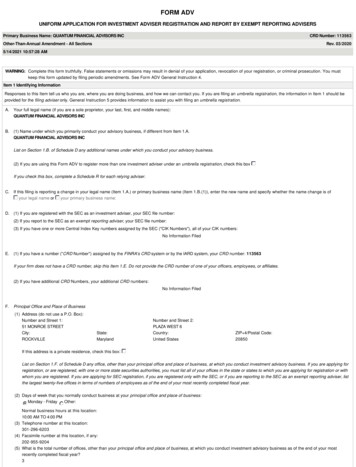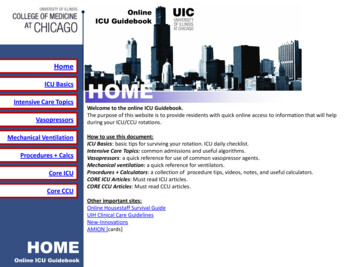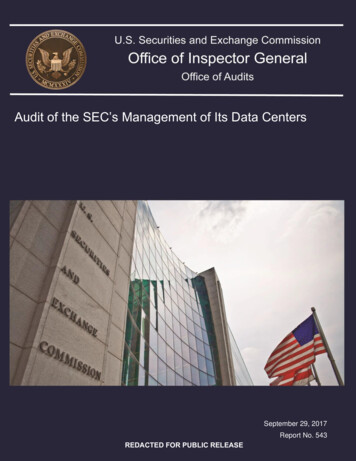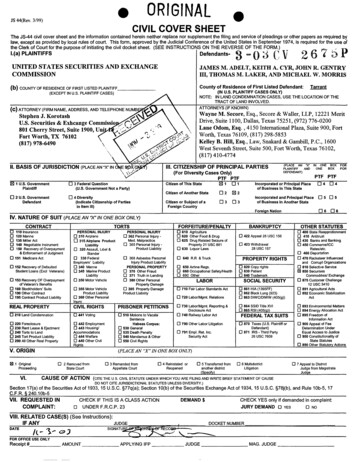
Transcription
ORIGINALJS 44(Rev . 3/99) CIVIL COVER SHEE TThe JS-44 civil cover sheet and the information contained herein neither replace nor supplement the filing and service of pleadings or other papers as required bylaw, except as provided by local rules of court . This form, approved by the Judicial Conference of the United States in September 1974, is required for the use ofthe Clerk of Court for the purpose of initiatin g the civil docket sheet . (SEE INSTRUCTIONS ON THE REVERSE OF THE FORM . )I .(a) PLAINTIFFS103 CCI Defendants-bUNITED STATES SECURITIES AND EXCHANGECOMMISSIONJAMES M . ADELT, KEITH A . CYR, JOHN R . GENTRYIII, THOMAS M . LAKER, AND MICHAEL W. MORRIS(b) COUNTY OF RESIDENCE OF FIRST LISTED PLAINTIFF(EXCEPT IN U .S. PLAINTIFF CASES )County of Residence of First Listed Defendant :Tarrant(IN U .S . PLAINTIFF CASES ONLY )NOTE: IN LAND CONDEMNATION CASES, USE THE LOCATION OF THETRACT OF LAND INVOLVED .ATTORNEYS (IF KNOWN)(C) ATTORNEY (FIRM NAME, ADDRESS, AND TELEPHONE NUM BWayne M . Secore , Esq., Secore & Waller, LLP, 12221 MeritDrive, Suite 1100, Dallas, Texas 75251, (972) 776-0200Lane Odom, Esq . , 4150 International Plaza, Suite 900, FortWorth, Texas 76109, (817) 298-585 3Kell ey B . Hill, Esq ., Law, Snakard & Gambill, P .C ., 1600West Seventh Street, Suite 500, Fort Worth, Texas 76102,(817) 410-4774Stephen J . KorotashU .S . Securities & Exhcange Commissio801 Cherry Street, Suite 1900, UniFort Worth, TX 76102(817) 978-6490II . BASIS OF JURISDICTION (PLACE AN "X" IN ONE 810kO 3 Federal Questio n1 U .S . Gove rn mentPlaintiffIII . CITIZENSHIP OF PRINCIPAL PARTIES(For Diversity Cases Only)PTF PTFCitizen of This State01Citizen of Another State 2Citizen or Subject of aForeign Count ry 3(U.S . Government Not a Party) 2 U .S. GovernmentDefendant 4 Diversity(Indicate Citizenship of Partiesin Item III)(PLACE AN 'X"PLAINTIFF ANDDEFENDANT) 1 Incorporated or Principal Placeof Business In This State02Incorporated and P ri ncipal Place 3 of Business in Another StateIN ONE BOX FORONE BOX FORPTF PT F 4 4 5 5 6 6Fore ign NationIV . NATURE OF SUIT (PLACE AN X" IN ONE BOX ONLY)CONTRACTTORTS 110 InsuranceFORFEITURE/PENALTYBANKRUPTCYPERSONAL INJURY PERSONAL INJURY 310 Airplane 362 Personal Injury 315 Airplane Product Med . Malpractice 365 Personal Injury Liability 320 Assault, Libel & Product LiabilitySlander 330 Federal 368 Asbestos PersonalEmployers' Liability Injury Product Liability 340 Marne PERSONAL PROPERTY 345 Marine Product 370 Other FraudLiability 371 Truth in Lending 350 Motor Vehicle 380 Other PersonalProperty Damage 355 Motor Vehicle 385 Property DamageProduct Liability Product Liability 360 Other PersonalIn u 610 Agriculture 620 Other Food & Drug 625 Drug Related Seizure ofProperty 21 USC 881 630 Liquor LawsREAL PROPERTYCIVIL RIGHTSPRISONER PETITIONS 864 SSID Title XVI 210 Land Condemnation 441 Voting 442 Employment 443 Housing/Accommodations 444 Welfare 440 Other Civil 510 Motions to VacateSentenceHabeas Corpus : 530 General 535 Death Penalty 540 Mandamus & Other 550 Civil Rights 730 Labor/Mgmt. Reporting &Disclosure Act 740 Railway Labor Act 790 Other Labor Litigation 870 Taxes (U .S. Plaintiff orDefendant) 871 IRS - Third Party26 USC 7609 120 Marine 130 Miller Act 140 Negotiable Instrument 150 Recovery of Overpayment& Enforcement of Judgment 151 Medicare Act 152 Recovery of DefaultedStudent Loans (Excl Veterans) 153 Recovery OF Overpaymentof Veteran's Benefits 160 Stockholders' Suits 190 Other Contract 195 Contract Product Liability220 Foreclosure230 Rent Lease & Ejectment240 Torts to Land245 Tort Product Liability290 All Other Real Property 640 R.R & Truck 650 Airline Regs . 660 Occupational Safety/Health 690 OtherLABOR 710 Fair Labor Standards Act 720 Labor/Mgmt . Relations 791 Empl . Ret. Inc .Security Act 422 Appeal 28 USC 156 423 Withdrawal28 USC 157PROPERTY RIGHTS 820 Copy rights 830 Patient 840 TrademarkSOCIAL SECURITY 861 HIA (1395FF) 862 Black Lung (923) 863 DIWC/DIWW (405(g)) 865 RSI (405(g))FEDERAL TAX SUITSRightsV . ORIGI Nba1 OriginalProceedin gOTHER STATUTES 400 State Reapprotionment410 Antitrus t430 Banks and Banking450 Commerce/ICCRates/etc. 460 Deportatio n 470 Racketeer Influence dand Corrupt Organization s 810 Selective Service 850 SecuritiesCommodities/ Exchange 875 Customer Challeng e12 USC 341 0 891 Agricultural Acts 892 Economic StabilizationAct 893 Environmental Matters 894 Energy Allocation Act 895 Freedom ofInformation Act 900 Appeal of FeeDetermination UnderEqual Access to Justice 950 Constitutionality ofState Statutes 890 Other Statutory Actions(PLACE AN X " IN ONE BOX ONLY) 2 Removed from 3 Remanded from 4 Reinstated or 5 Transferred from 6 MultidistrictState Court Appellate Court Reopened another district Litigation(specify) 7 Appeal to DistractJudge from MagistrateJudgeVI . CAUSE OF ACTION (CITE THE U S . CIVIL STATUTE UNDER WHICH YOU ARE FILING AND WRITE BRIEF STATEMENT OF CAUSEDO NOT CITE JURISDICTIONAL STATUTES UNLESS DIVERSITY. )Section 17(a) of the Securities Act of 1933, 15 U .S .C . §77q(a) ; Section 10(b) of the Securities Exchange Act of 1934, 15 U .S .C . §78j(b), and Rule 10b-5, 17C.F .R . § 240 .10b-5VII . REQUESTED IN CHECK IF THIS IS A CLASS ACTION DEMAND CHECK YES only if demanded in complaint :COMPLAINT: UNDER F .R .C .P . 23JURY DEMAND YES NOVIII . RELATED CASE ( S) (See Instructions) :IF ANYDATEJUDGE DOCKET NUMBERSIGNATU ECOFOR OFFICE USE ONLYReceipt # AMOUNT APPLYING IFP JUDGE MAG . JUDGE
NIALU.S . DISTRICT COURTNORTHERN DISTRICT OF TEXA SIN THE UNITED STATES DISTRICT CURTFOR THE NORTHERN DISTRICT OF T XAS 'DALLAS DIVISIO NSECURITIES AND EXCHANGE COMMISSION ,FILEDNOV -341CLERK, U.S. DISTRICT COURTByDeput yPlaintiff,CIVIL ACTION NO. :V.JAMES M . ADELT, KEITH A . CYR, JOHN R .GENTRY III, THOMAS M . LAKER, ANDMICHAEL W . MORRIS,CV 27a PDefendants .COMPLAINTPlaintiff, Securities and Exchange Commission ("Commission"), for its Complaintagainst defendants James M . Adelt, Keith A. Cyr, John R. Gentry III, Thomas M . Laker, andMichael W . Morris ("Defendants") alleges and states that :SUMMARY1 . Between January 2, 2002 and January 10, 2002, Defendants, all of whom wereAmeriCredit Corp . ("AmeriCredit") employees, engaged in unlawful insider trading by sellingAmeriCredit stock while in possession of material nonpublic information, in breach of afiduciary duty owed to AmeriCredit's shareholders . In the course of their duties, Defendantsobtained material nonpublic information about AmeriCredit's financial performance for thequarter ending December 31, 2001 . Based on the information, Defendants sold AmeriCreditstock between January 2, 2002 and January 10, 2002, prior to public release of the information ina January 10, 2002 AmeriCredit earnings announcement . The price of the company's stockdeclined sharply following the announcement, and four of the Defendants avoided losses,totaling 106,772, by selling AmeriCredit shares in advance of the announcement . The fifth
Defendant, Laker, earned profits of approximately 82,650 by selling the stock "short" just hour sbefore the announcement.JURISDICTION AND VENU E2 . This Court has jurisdiction over this action pursuant to Section 22(a) of theSecurities Act of 1933 ("Securities Act"), Section 21A of the Securities Exchange Act of 1934("Exchange Act"), and 28 U .S .C. § 1331 . Each Defendant, directly and indirectly, made use ofthe mails and of the means and instrumentalities of interstate commerce in connection with theacts, practices and courses of business described in this Complaint . Venue is proper in thisCourt, under Section 27 of the Exchange Act, because many of the transactions, acts, practicesand courses of business described below occurred within the jurisdiction of the Northern Districtof Texas .PARTIES3 . The Commission is the United States governmental agency responsible fo renforcing the federal securities laws for the protection of investors .4. Defendant James M . Adelt, age 49 and a resident of Grapevine, Texas, is a seniorvice president of information technology at AmeriCredit's Fort Worth headquarters .5 . Keith A . Cyr, age 38 and a resident of Mansfield, Texas, was an assistant vicepresident of collections in the Arlington, Texas collections center at the time of the acts allegedin this Complaint .6. Defendant John R. Gentry, III, age 47 and a resident of Stanley, North Carolina, isan executive vice president of collections in the company's Charlotte, North Carolina collectionscenter .7 . Defendant Thomas M . Laker, age 42 and a resident of Fort Worth, was theassistant vice president in AmeriCredit's accounting department at the company's Fort Worthheadquarters at the time of the acts alleged in this Complaint .
8. Defendant Michael W. Morris, age 39 and a resident of Fort Worth, was a vicepresident of marketing at the company's Fort Worth headquarters at the time of the acts allegedin this Complaint .STATEMENT OF FACTSAmeriCredit's Collection Activities9. AmeriCredit provides financing to borrowers who are unable to obtain car loansfrom traditional sources because of bad credit or low income . These non-prime borrowers, as agroup, are associated with above average delinquency and default rates .10. The finance contracts AmeriCredit purchases, and the loans AmeriCredit extendsto consumers, at least initially, constitute receivables on AmeriCredit's books . According toAmeriCredit, its results of operations, financial condition and liquidity depend on theperformance of these contracts and loans, which generate all of AmeriCredit's revenue .11 . AmeriCredit also securitizes a portion of its receivables, in order to diversifyfunding, improve liquidity, and obtain funds to buy more consumer contracts . Securitization isthe process of distributing risk by aggregating debt instruments in a pool, and then issuing newsecurities backed by the pool ("asset-backed securities") . AmeriCredit transfers its automobilereceivables to a securitization trust, which issues asset-backed securities for sale to investors .AmeriCredit earns a "spread," which is the difference between the interest rate AmeriCredit paysthe investors, and the rate it receives from its borrowers . AmeriCredit retains responsibility forcollecting payments from the borrowers on the underlying receivables .12. AmeriCredit has five collection centers across the United States and Canada toservice and manage all of its receivables, including securitized receivables . From these centers,AmeriCredit employees contact borrowers who are delinquent in making payments on theirloans.
13. AmeriCredit also maintains an internal data system report that contains andreflects delinquency rates, charge-off rates, numbers of borrowers in bankruptcy, repossessionrates, and number of accounts deferred in its loan portfolio . AmeriCredit produces reports fromthe system daily, which show AmeriCredit's loan portfolio's performance on each day, alongwith historical data comparing that day's collection statistics with prior months and quarters, andthe prior year, for each individual collection center, and collectively for the entire company .14. On January 2, 2002, AmeriCredit generated an internal report ("the Report") thatrevealed, in the second quarter of 2002 (AmeriCredit's fiscal year 2002 was from July 1, 2001through June 30, 2002), that 3 .8% of the company's total managed auto receivables were morethan 60 days delinquent, compared to 2 .7% in the same quarter of 2001 (a 41% difference), and3.1% in the first quarter of 2002 (an increase of 23%) . The Report also showed that AmeriCreditcharged off 4 .3% of its average managed auto receivables, compared to 3 .6% in the same quarterof 2001 (a 19% increase) .15 . Defendants Gentry, Cyr, and Morris had access to the Report and therebyobtained the information alleged in the preceding paragraph 14 of this Complaint .16. Each page of the Report bears the following warning : "PROPRIETARYINFORMATION : The information presented is proprietary in nature and must not becommunicated outside the company."17. Defendant Adelt had access to the information in the Report throughAmeriCredit's computer network and thereby obtained the information alleged in paragraph 14of this Complaint.18. The information in the Report was nonpublic .19. Defendant Laker was an assistant vice president in AmeriCredit's accountingdepartment with primary responsibility over AmeriCredit's general ledger . As part of his duties,Defendant Laker made accounting entries, and supervised and directed other AmeriCredit
employees to make accounting entries in AmeriCredit's general ledger . Defendant Laker hadaccess to non-public information regarding delinquencies and charge-offs .20 . The information in AmeriCredit's general ledger was nonpublic.Second Quarter of 2002 Earnings Release and Market Reaction21 . On January 10, 2002 at 4 :18 p .m. CST, after trading on the New York StockExchange closed for the day, AmeriCredit publicly announced its second quarter 2002 earnings("the Release") via Business Wire . The Release stated that AmeriCredit achieved "record netincome of 80.6 million, or .091 per share, for its second fiscal quarter ended December 31,2001, versus earnings of 48 .4 million, or 0 .57 per share, for the same period a year earlier."AmeriCredit also stated in the Release that "on a comparative basis, net income increased 66%and earnings per share rose 60% ." The Release also reported, in comparison to the secondquarter of the previous year, a 76% increase in net income, a 47% increase in loan purchases, anda 51% increase in managed auto receivables . In addition, the Release included the increase indelinquency and charge-off rates that appeared in the Report .22. On January 10, 2002, AmeriCredit stock closed at 28 .01, on volume of2,403,600 shares . After AmeriCredit disseminated the Release, AmeriCredit's stock pricedropped. It closed at 25 .04 on January 11, 2002, on volume of 10,539,000 shares . On the nexttrading day, January 14, 2002, it closed at 22 .60 on volume of 5,494,200 shares .23. On January 11, 2002, analysts began publishing research reports discussing theRelease . The analysts acknowledged in these research reports that AmeriCredit's fiscal secondquarter earnings were in line with, or above, analysts' estimates, and that AmeriCredit forecastedbetter-than-average earnings through December 2002 . The research reports also stated thatAmeriCredit expected its per share earnings for fiscal year 2002, and the first half of 2003, toexceed analysts' projections . But the analysts' reports also uniformly cited the rise indelinquencies as cause for doubt about the quality of AmeriCredit's loan portfolio, and loan
recovery rates . Other research reports also included charge-off and deferment rates ascontributing to these concerns . One analyst at Bear Stearns downgraded AmeriCredit stock"primarily [because] delinquencies and losses are rising faster than we had originally anticipatedand the margin isn't providing enough of an offset."AmeriCredit's Employee Stock Option Plan and Employee Stock Purchase Plan24. Pursuant to their employment agreement with AmeriCredit, Defendants Adelt,Cyr, and Gentry received from AmeriCredit, through an employee stock option plan ("ESOP"),options to purchase shares of AmeriCredit stock from the company at a pre-determined price .When Defendants Adelt, Cyr, and Gentry exercised stock options, they could simultaneously sellthe shares on the open market .25 . Under the employee stock purchase plan ("ESPP"), employees authorized thecompany to withhold a portion of their earnings, and AmeriCredit used that money to purchaseAmeriCredit shares on their behalf, at a discounted price . Once the shares were purchased,employees had discretion to sell them .26. AmeriCredit contracted with E*trade to administer its ESOP and ESPP .AmeriCredit created brokerage accounts for its employees with E*trade, and provided E*tradewith all pertinent information necessary to administer the ESOP and ESPP .27. Defendants Adelt, Cyr, and Gentry could access their E*trade accounts - toexercise AmeriCredit stock options and sell AmeriCredit shares - via the Internet . They couldalso access their E*trade accounts to sell shares in their ESPP accounts via the Internet .Improper Trade s28. On January 3, 2002, Defendant Adelt accessed the nonpublic delinquency andcharge-off information in the Report via his computer at AmeriCredit corporate headquarters .Less than two hours later, Defendant Adelt accessed his E*trade account . He placed an order toexercise options to purchase 4960 shares of AmeriCredit stock, and simultaneously sold them at
31 .02 per share . As a result, Defendant Adelt avoided approximately 41,763 in losses that hewould have incurred by selling his AmeriCredit shares on January 14, 2002, after the market hadreacted to the information in the Release .29 . On January 2, 2002, Defendant Cyr obtained the Report from a company printer .As part of his regular duties, Defendant Cyr prepared a one-page summary of the Report, and emailed the summary to Defendant Gentry and several other employees in AmeriCredit'scollections centers. Defendant Cyr's e-mail message showed delinquency rates for eachcollection center, and collectively for the company, that ultimately appeared in the Release .After sending the e-mail message on January 2, 2002, Defendant Cyr placed several tradesthrough E*trade. Defendant Cyr exercised options to purchase 540 shares of AmeriCredit stockon January 2, and simultaneously sold them at 29 .75 per share . Also on January 2, DefendantCyr sold 232 .8113 of his ESPP shares for 29 .90 per share . On January 4, Defendant Cyrexercised options to purchase another 540 shares of AmeriCredit stock, and sold them at 31 .55per share . By selling at those prices, Defendant Cyr avoided approximately 10,393 in lossesthat he would have incurred by selling his AmeriCredit shares on January 14, 2002, after themarket reacted to the information in the Release .30. On the morning of January 2, 2002, Defendant Gentry received from DefendantCyr the e-mail message containing a summary of the information in the Report, and reviewed it,according to his usual practice . Later that same day, Defendant Gentry sold 452.86601 of hisESPP shares at 30 .03 per share . On January 4, 2002, Defendant Gentry exercised options topurchase 3020 shares of AmeriCredit stock, and simultaneously sold them at 31 .70 per share .Also on January 4, Defendant Gentry exercised options to purchase an additional 1400 shares ofAmeriCredit stock, and simultaneously sold them at 31 .71 per share . As a result, DefendantGentry avoided approximately 43,600 in losses that he would have incurred by selling his
AmeriCredit shares on January 14, 2002, after the market reacted to the information in theRelease .31 . The delinquency and charge-off information in the Report and e-mail upon whichDefendants Adelt, Cyr, and Gentry based their trades was not publicly disclosed until it appearedin the Release on January 10, 2002 .32 . With the knowledge of AmeriCredit's increased delinquency and charge-offs forthe quarter ending December 31, 2001, Defendant Laker, on January 10, 2002, at 1 :56 p .m. EST,sold 15,000 shares of AmeriCredit "short" at 27 .26, and at 3 :54 p .m. EST, he sold an additional1,000 shares "short" at 27 .85 per share. Defendant Laker covered his "short" position onJanuary 22, 2002 at 22 per share, resulting in total actual profits from the January 10, 2002"short" sales of 84,750 .33. The delinquency and charge-off information upon which Defendant Laker basedhis trades was not publicly disclosed until it appeared in the Release on January 10, 2002 .34 . Defendant Laker also "shorted" AmeriCredit stock ahead of the company'searnings announcement for the quarter ending September 30, 2001 . On
14. On January 2, 2002, AmeriCredit generated an internal report ("the Report") that revealed, in the second quarter of 2002 (AmeriCredit's fiscal year 2002 was from July 1, 2001 through June 30, 2002), that 3.8% of the company's
